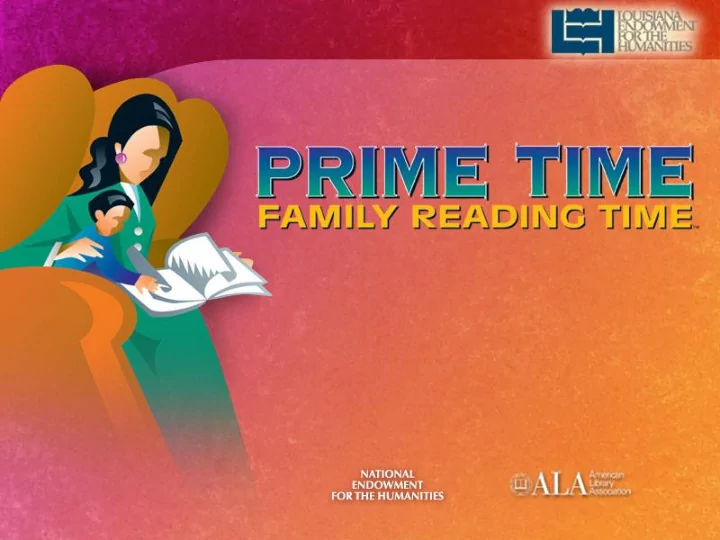

Methodolog Methodology 1. Promotes participant- centered instruction and learning; 2. Employs the Socratic Method and open-ended questioning; 3. Develops higher order thinking skills; 4. Makes connections to quality literature, and; 5. Uses the collective learning approach to bond students and families around reading.
Humanities Humanities-Based Based Discussion Discussion • Thematically-grouped sessions • Offers a chance to discuss real-life issues such as: Freedom, Belief Systems, Work & Economy, Peace & Conflict, and Interdependence
Book Books
Tar arget F get Families amilies • Low-income and/or low to beginning literacy • 3-10 year old children at risk for low reading skills • English language learners • Infrequent/non library users
Sc Scholar R holar Role ole • Humanities Professor/Instructor • Loves books and reading • Comfortable with audiences • Comfortable asking questions • Good listener
Stor Storyteller yteller Role ole • Knowledge of children ’ s literature • Comfortable with audiences • Demonstrates storytelling techniques • Comfortable sharing the audience • Good listener
Program Goals Provide developmentally appropriate humanities-based programming for 3-5 year olds and significant adults Provide developmentally appropriate pre-literacy experiences for 3-5 year olds and significant adults Provide model for supporting literacy acquisition to (educationally & economically vulnerable) parents Encourage a culture of literacy in the home
Target Families • Economi nomicall ally y or educati tion onall ally y vuln lnerable le families ilies • 3-5 year old d chil ildr dren en at risk k for r low w reading ing skill lls • Engli lish sh langua guage e learn rner ers
Books
Preschool Facilitators • Experienced early childhood educators • Model book-sharing techniques • Model discussion techniques • Promote parent/child interaction • Facilitate center exploration
Could Prime Time be used as a form of Bibliotherapy?
Types of Bibliotherapy • The literature available on bibliotherapy has identified several main types of bibliotherapy. • Developmental – which helps children understand normal health and developmental changes and aims to assist children in understanding problems before they arise in the child’s life. • Clinical – is aimed at helping children cope with serious emotional problems and occurs in a structured setting, supervised by a therapist, counselor, or psychiatrist. • Creative – which uses creative writing, biographical writing, fiction, and poetry to improve general well-being. • Informal – which involves a more social approach to the use of fiction, allowing librarians, school counselors, and other professionals to recommend books for use in group discussions.
The Effectiveness of Bibliotherapy • Research has shown that bibliotherapy is generally effective for specific groups. In a meta-analysis of studies performed on the effectiveness of bibliotherapy in adults, Marrs (1995) found that the most helped groups of people included those with a lack of assertiveness, general anxiety problems, and sexual dysfunction. Other most-helped areas include test-anxiety, unhealthy attitudes, depression, and inappropriate behaviors.
The Effectiveness of Bibliotherapy • Emotional disorders were also found to benefit from bibliotherapy. Ackerson, Scogin, McKendree-Smith, & Lyman (1998) performed a study of 22 adolescents experiencing depression symptoms. They assigned the participants a self-help book (Feeling Good, Burns, 1980) to be read during a four-week period and measured the changes in self-reports and parental reports of depressive symptoms after the participants finished the book. They found that in participants who completed the reading there was significant reduction in depressive symptoms and in dysfunctional thinking.
The Effectiveness of Bibliotherapy • In their 1989 meta-analysis, Riordan and Wilson reported that bibliotherapy was largely ineffective when used to improve self-concept in children and adolescents with behavioral problems.
Sample Reading
Group Discussion
Recommend
More recommend